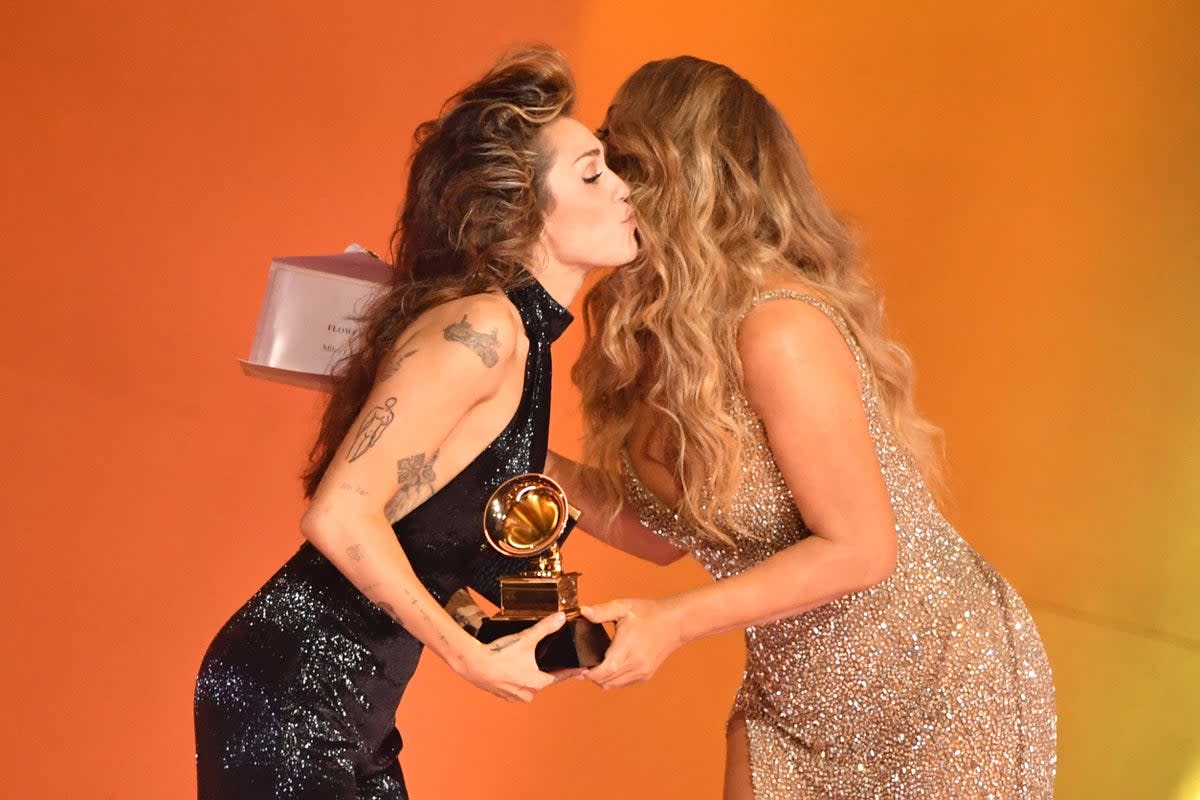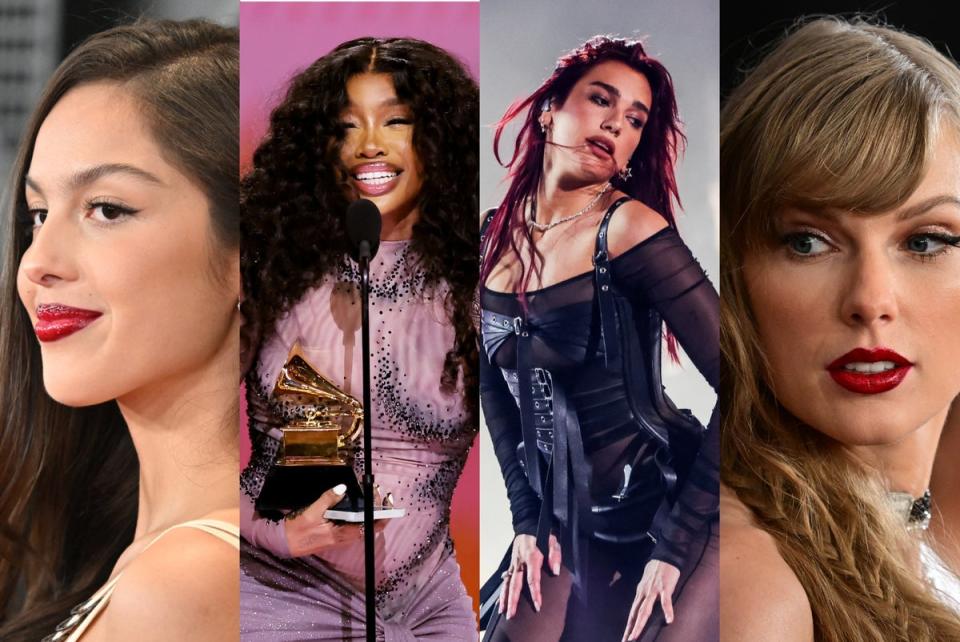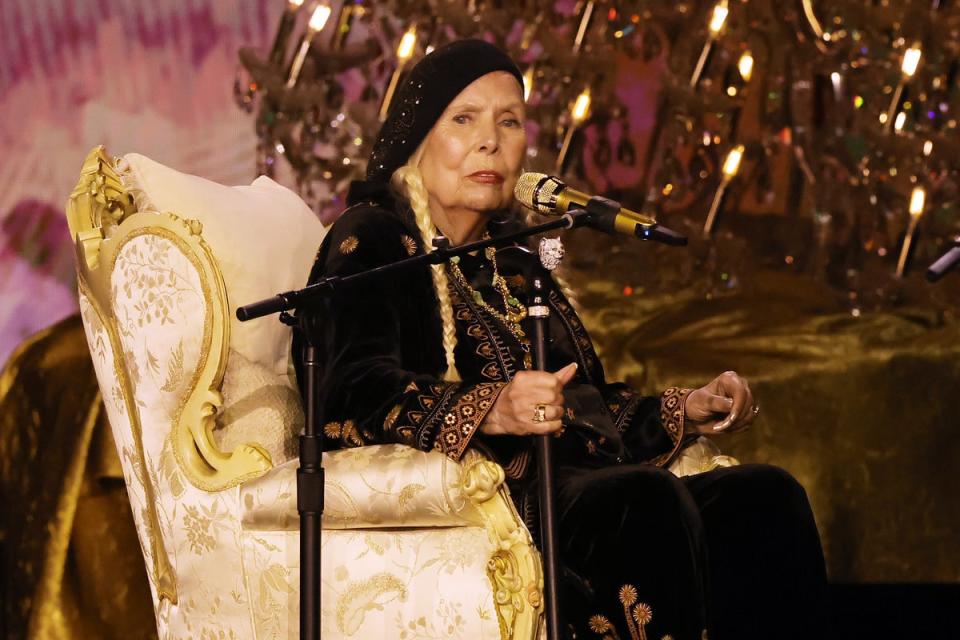The 2024 Grammys proved a true celebration of women in music (and atoned for Harry Styles)

This year all five nominees are WOMEEEEN!” trilled Mariah Carey, introducing the Pop Solo Performance category and very much channelling the unspoken air punch in the room. In a venue named the Crypto.com Arena, ironically, it was the bros at the bottom of the bill at the 2024 Grammy Awards.
Taylor Swift secured her record-breaking fourth Album of the Year award, up against six other women and token dude Jon Batiste. SZA led the nominations list with nine nods, two of which she won before her Uber Lux even showed up. Kylie Minogue grooved joyously to Tracy Chapman playing “Fast Car” beside Meryl Streep and a deflated-looking Ed Sheeran, stoic in the face of long-standing award show norms crumbling around him.
Somewhere down the endless list of awards, there was even a nomination for “Belinda Says” by Alvvays, as if someone at the Recording Academy had reached into my brain and correctly plucked out the actual song of the year. It was, as host Trevor Noah acknowledged early on, the Year of the Women.
The ceremony, often criticised over issues of inequality, had a certain amount of making up to do. Last year’s shindig saw Harry Styles sashay into what was cued up to be a clash of the fem-pop titans between Beyoncé and Adele to, rather bafflingly, snatch Album of the Year from them both. A Grammys overwhelmingly dominated by immense female talent had been a long time coming – 26 years, to be precise, since Lauryn Hill, Celine Dion and Madonna swept the board in 1998.
Whether it was boygenius proving themselves the assembling Avengers of alt-country pop, Olivia Rodrigo turning new generations on to gnarly melodic rock or Lana Del Rey cementing her position as the queen of sultry sepia torch songs that forget to stop after the last chorus, women have undeniably produced the most vital mainstream music of the past 12 months. And, rather than a brief Twitter-friendly rebalance on the part of the Grammys, it feels as though a genuine cultural sea change is under way.
Just witness the female empowerment exuding from the Grammys stage. Performing “Flowers”, her anthem of defiant self-love, Miley Cyrus blossomed into an amalgam of Tina Turner, Pat Benatar, Stevie Nicks, and a Charlie’s Angel telling Charlie to stick it. In a literal bin fire of a set, SZA defied all reasonable advice that a dark alleyway full of muggers might not be the best place to stage an R&B performance, yet still knifed her way out of trouble with her rendition of “Kill Bill”.

Rodrigo stole the night with a striking, blood-drenched rendition of “Vampire” resembling the climactic showstopper from a Carrie musical. Annie Lennox delivered a coruscating “Nothing Compares 2 U” in tribute to Sinead O’Connor, a silver tear etched down her face. And we were granted a glimpse into the court of Joni Mitchell, this legendary crafter of modern song seated on a cushioned throne, tapping a regal cane and surrounded by chamber orchestra courtiers. Queens, all.

Besides Travis Scott smashing up his post-apocalyptic Currys, the guy sets seemed cowed by comparison. Stevie Wonder and a virtual Tony Bennett made a clunky pairing while Jon Batiste’s unfocused jazz-gospel medley (in which everyone on stage seemed to be playing different songs throughout) was easily upstaged by Oprah Winfrey’s thundering tribute to Tina Turner, and a butt-quaking performance of “Rollin’ on the River” by Fantasia Barrino. Only Jay-Z matched the women’s passion on the night, and that was only by going full Kanye out of frustration that Beyoncé – his wife and the most decorated artist in Grammys history – had still never won Album of the Year.
That Swift did pick up her fourth, record-breaking AOTY award only capped what may well turn out to be a pivotal moment in pop culture. Mainstream music is often predictable, formulaic, and unimportant, while award ceremonies are generally asinine, smug and self-congratulatory, back-slapping cash cows a million miles from art. But this year’s Grammys was a sign that raising voices can lead to wider change for the better, and hopefully for good. Grammys? Gram-SHES, more like…

 Yahoo News
Yahoo News 
